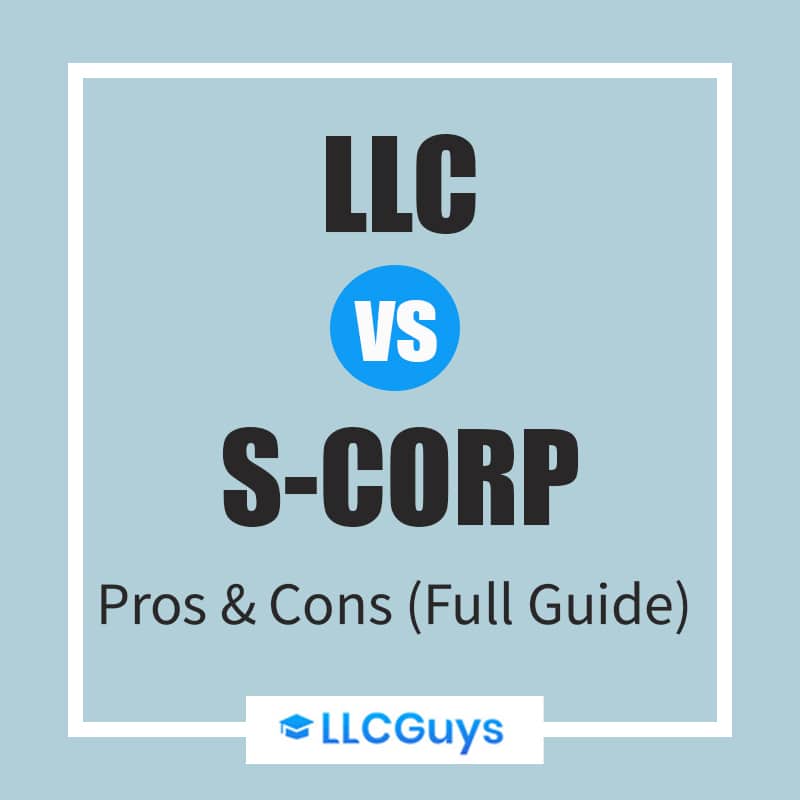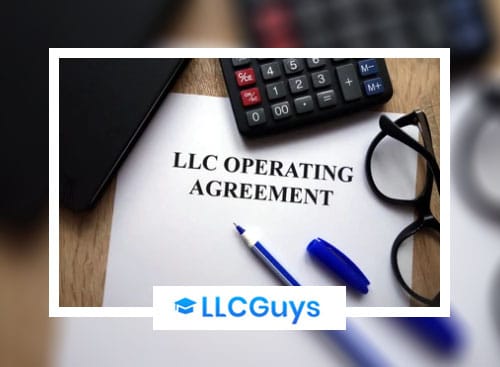LLC vs. S Corp (Full Comparison) – Pros & Cons Revealed
Form Your LLC or S Corp Today (from $0+state fees)

When forming a business, one of the biggest and most difficult decisions you are going to have to make is what business structure is best. This could be key to the overall success of your business. S Corps and limited liability companies are often confused, as they are often discussed together, even though they are talking about different aspects of the business. An LLC is a type of business structure, while an S Corp is a tax classification. The two are very different, and there are pros and cons to both, with differences including taxes to management structure. To make things even more confusing, in some cases a business can be both an LLC and an S Corp. This is because you are able to form an LLC and then opt to be taxed as an S Corp, or alternatively, you can just work with the default taxation system of LLCs.
We are going to take a look at the two different structures to help you make that all-important decision.
- Form Your LLC or S Corp Today (from $0+state fees)
- What is an LLC?
- Pros and Cons of LLC
- How to form an LLC?
- What is an S-Corp?
- Pros and Cons of an S-Corp
- S-Corp Requirements
- How to file as an S Corp?
- S-Corp Fees
- Top-2 Services to Form an S Corp or LLC For You
- Lastly, Why Make The Decision to Start an LLC or an S-Corp?
What is an LLC?
An LLC stands for limited liability company, a legal business entity that is a popular choice when it comes to business structure. This type of business is usually used by a sole proprietor or a company that has two or more owners. It can be used for companies of a range of sizes. This type of business structure is best known for protecting the personal assets of the business owner. Therefore, if the business gets into trouble further down the line, it is only the business’s assets that the creditors or plaintiff can go after, not the personal assets of the members. It is a pass-through entity, which means that the members of the company report earnings on their personal tax returns.
This is a popular choice for those that want a more formal business structure in contrast to a sole proprietorship or a partnership. Despite being more formal, it is still very flexible in the way that the business is run and how the profits can be distributed. They are also very flexible when it comes to their tax status.
If an LLC decides to work with the default taxation system for LLCs, then it is taxed in the same way as a sole proprietorship or a partnership. They are taxed differently to corporations, as they allow what is known as pass-through taxation, where the business income or losses will pass through the business and are recorded on the owner’s personal tax return. So, this means that the profits are taxed at the owner’s personal tax rate. If the company has one owner, then it is usually taxed as a sole proprietorship. If it has multiple members, then it would be taxed as a partnership.
When it comes to management structure, the owners of the LLC can choose whether the owners or the managers they have designated actually run the business. If the owners take up the management positions, then the business will run in a similar way that a partnership does.
Pros and Cons of LLC
Pros
Cons
How to form an LLC?
Forming an LLC is not particularly hard, but it can be time-consuming, and a little confusing if you don’t know what you are doing. There are several steps associated with forming an LLC, and although the process is similar in all states, some may have additional forms or requirements.
See our full guide on how to start an LLC here.

Step 1: Choose a name
The first stage of the process is choosing a name. Your name of choice should follow all the state guidelines and can’t already be a formed business in that state, so the name has to be unique.

Step 2: Assign a Registered Agent
The next step in the process is to assign a registered agent to your company. This is the person that handles all of the legal mail and papers on behalf of the LLC. You are able to be your own registered agent, or have someone you know be a registered agent of pay a company to be your registered agent.

Step 3: File Articles of Organization
It is then time for you to file your Articles of Organization with your local office for Secretary of State. These forms show the basic information about the company, and these could differ from state to state. For most, you will need to supply information such as the company name, the LLC address, a list of the owners, and name and address of the registered agent to name a few of the fields required.

Step 4: Create an Operating Agreement
An operating agreement is not required by all states, but even if it is not required by the state, it is still advisable that you have one. This document stipulates how the LLC will be managed and run. It explains elements such as how profits and losses will be managed and the procedures for new members etc. It may also stipulate how the LLC would be dissolved. This should be kept with your business records, and updates whenever there are changes in the business.

Step 5: Obtain an EIN
Again, this step is not required in all states or for all businesses, but if the business has more than one owner, you’ll have to establish an Employer Identification Number to identify the company.

Step 6: Extras
Once your LLC has been set up, you will need to check with your local state, county and town offices to see if there are any business licenses or permits that you should be aware of. If there is, then these will need to be filed to ensure your company follows local requirements. Sometimes these will have to be in place before you start operating your business. If you are selling goods that require local sales tax, then you will also need to file with your local tax office.
As mentioned previously, it is very important to note that these may not be the whole list of steps, as some states may have some additional or different requirements to follow. Once you have filed your LLC, from then on you will have to file an annual report, which can cost further filing fees. In some cases, this is a few $100 every year.
What is an S-Corp?
S Corp stands for S Corporation, and is also sometimes referred to as an S subchapter. It is a tax election that is used to let the IRS known that you have chosen for your business to be taxed as a partnership. To become an S Corp, you will have to first go through the process of registering your business as either a C corporation or an LLC. This will prevent your business from incurring corporate-level double taxation.
If you are a business owner of an S corp, you will be known instead as a shareholder, and even if you own the business, then you will still be considered an employee, so will have to pay yourself a salary. All profits, losses, credits, and deductions are taxed at the shareholder level. You are able to have up to 100 shareholders and still remain as an S Corp. The key takeaway here is that an S corp is actually not a type of business, it is a type of tax election, which is why an LLC can also be an S corp.
Essentially, the main difference between an LLC and an S Corp when it comes to taxation is that owners that work in an S are also considered company employees, while LLC owners are considered self-employed.
It should be noted that S Corp owners, who are also employees, have to pay themselves a reasonable salary for the work that they do in the business.
Pros and Cons of an S-Corp
Pros
Cons
S-Corp Requirements
There are a few requirements that come with forming an S Corp, which may prevent some companies from making this move. In order to be eligible to be taxed in this way, you must meet the following:
How to file as an S Corp?
If you meet all of the requirements and your business qualifies to be taxed as an S Corp, you then have to set it up. This is a relatively simple process.
If you haven’t already done it, then you have to actually form the LLC or the corporation. The second step is then filling out and filing the form for articles of incorporation, which can also be called the certificate of incorporation. This can be filed to the secretary of state’s office where your business is. This form will detail all the basics of your business.
Once this has been completed, you file a form with the IRS, electing S Corporation taxation. Your state will have to first accept the above forms and your business name. Form 2553 can be found on the IRS website or at any local IRS office. Every shareholder in the business must sign the form before it is submitted to the IRS, or it is not official. It must be filed by March 15 of the tax year during which you want to convert to an S Corporation. Your business will then review the form and make sure your business makes all the necessary requirements.
S-Corp Fees
The fees that are required to establish an S Corporation can change and vary depending on a number of factors. One of the depending factors is the complexity of the corporation and the state where the business is established. Some of the key fees that you should expect to pay include fees for the articles of incorporation, which typically range between $100 and $250. If you choose to have a lawyer process the fees for you, then the price of this service can add up considerably. Prices for lawyers tend to start at a few hundred dollars but is the structure of the S Corporation is very complicated and requires a lot of time and work, then this can potentially add up to a few thousand dollars.
You then have to consider annual reporting fees in a state, which range between $500 and $800 every year, plus insurance costs, which depend on the type of business. As you can see, setting up as an S Corp is an expensive process and something that should be taken into consideration when making the decision of how you want your business to be taxed.
Top-2 Services to Form an S Corp or LLC For You
For many, especially those that are new to running a business, the whole process of forming an LLC or an S Corp can be a little daunting. There are quite a few processes to go through and forms to fill out, which is also time-consuming. It is not surprising, therefore, that many companies opt to have a third-party service do all the hard work for them. There are many companies out there that will complete this for you, some of which are better than others. Two of the best and most reputable are Zenbusiness and IncAuthority.
#1: Northwest Registered Agent
Northwest is actually our #1 rated LLC service so far. It has by far the best customer support and by far the best pricing (even though on paper it’s slightly more expensive than ZenBusiness) considering that you get +1 year of free Registered Agent service once you use their service.
Here is a full review of Northwest.
#2: ZenBusiness
Zenbusiness is one of the best, and therefore most popular, business formation services out there. They offer exceptional services at some of the cheapest prices, making the process of idea to opening easier. The experts will help you navigate the business start-up process, which includes helping you find the right business structure and registering your business. The company offers an LLC formation service package which is very cheap and offers everything you need to form a business, while also providing a service to help your business become an S Corp, with the customer service team on hand to help you every step of the way.
Check out our ZenBusiness review.
Lastly, Why Make The Decision to Start an LLC or an S-Corp?
If you make the right choice, changing tax classification could end up saving the business a lot of money in the long run. Alternatively, if you end up choosing the wrong classification, then it could have the opposite effect. The decision is not always obvious, which is why it is going to take some thinking.
The things to consider are your company’s profitability, the potential taxes of the business, and the plans for growing the business in the future, plus your plans for retirement.





